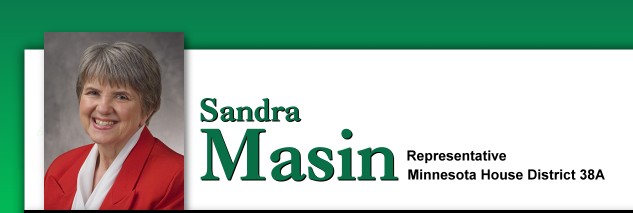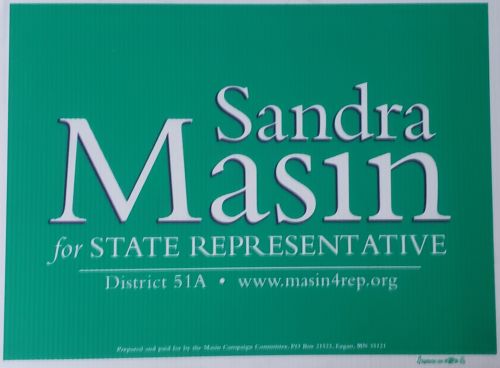|
» Return
This article was originally posted on
06-25-2015
Rep. Masin's Editorial Column in the SunThisWekk The SunThisWeek published the following guest column article by Rep. Masin in its print and online editions today: Legislative session leaves unfinished businessby Rep. Sandra Masin, DFL-Eagan
Special to Sun Thisweek
Dakota County TribuneOn Friday, June 12, and into the early morning of June 13, the Legislature held a special session to conclude the work left unfinished during the regular session. Like many of you, I was disappointed that a special session was necessary and a bipartisan compromise wasn't reached sooner. However, I am pleased that the special session has concluded and that all sides were able to come to an agreement in time to avoid a government shutdown. To shed light on this, I'd like to share this recap of what happened.
We needed a special session because three budget bills were vetoed. The biggest sticking point that led to the special session was that the House Republicans didn't want to adequately invest in education. They refused to work with Gov. Mark Dayton and invest just $25 million more in an education bill that he would sign into law. Also vetoed were two other controversial bills -- the jobs and energy bill and environment and agriculture bill. If we didn't pass those bills by July 1, the state would have faced a partial government shutdown.
I am pleased to let you know that the final budget increased our investment in Minnesota's kids and future. The initial budget passed by the House Republicans provided less than a 1 percent increase for Minnesota schools. In a decade where we've seen class sizes balloon and schools cut programs, this would have forced teacher layoffs and even larger classes for our students.
Since the veto, Dayton was successful in getting the House Republicans and Senate Democrats to agree to invest $125 million more in education, which includes a 2 percent increase in the per-pupil formula each of the next two years. In today's dollars, we're 24 percent below the per-pupil funding levels of 2003, so the increase in funding is essential. Still, we could have done better. It was disappointing that House Republicans were prepared to shut down state government over a refusal to invest more in education.
As for the other two bills, we were able to improve them, but I still voted no on both of them because they rolled back decades of progress on clean and renewable energy, and environmental protections and oversight that keep our air and water clean. The environment bill also shifted $66 million out of funds used to clean up landfills, including $8 million from the emergency cleanup fund for Minnesota's two biggest open landfills, one of which is in Burnsville.
Also passed was a small bonding bill that includes a handful of infrastructure projects throughout the state; a Legacy bill that supports outdoors, clean water, parks and arts; and a technical bill making corrections to statutes.
Unfortunately, the Legislature left a lot to do next year. Fixing our state's roads and bridges was a top priority, but maintaining the status quo with a "lights on" transportation bill was all that passed. There also wasn't tax relief for homeowners, renters or farmers. Tuition and debt for students at our public universities is also going to start increasing after the tuition freeze was discontinued. What makes this hard to understand is why my colleagues on the other side of the aisle insisted on keeping nearly $1 billion of our state's surplus on the state's bottom line for a promised tax giveaway next session, largely to corporate special interests.
With a $1.9 billion surplus and a growing economy, we missed a significant opportunity to improve our state for hard-working Minnesotans. I believe our agenda next session should be geared toward hard-working families whose priorities were not answered this session. We should look for ways to make college more affordable and reduce student debt, pass a bipartisan transportation compromise that will fix our state's transportation system, improve workplace conditions for families and workers, and continue to improve our state's world class education system for all of Minnesota's students.
DFL State Rep. Sandra Masin represents District 51A, which includes western Eagan and northern Burnsville. Columns reflect the opinion of the author.
Thank you, SunThisWeek, for printing this column.
» Return
|
Your VOICE IS IMPORTANT!
VOTE!
The PRIMARY Election will be held on August 9, 2023. It is important that
you vote on this date to affirm your choice of candidate in the GENERAL election in November.
The 2023 GENERAL Elections will be held on November 7, 2023.
Please tell us what issues are important to you. We would love to know...
|


